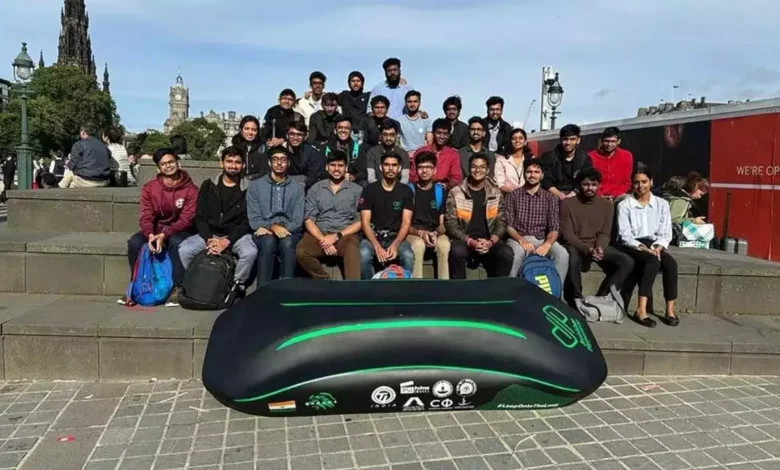Travel from Chennai to Bengaluru in just 30 minutes via vacuum-powered pod
A 50-member team of students from IIT Madras is eagerly working on the 'Avishkar Hyperloop' aiming to turn the Chennai-Bengaluru quick-travel dream into reality.

When was the last time you traveled from Chennai to Bengaluru? Did it take you hours? Imagine if this exhausting journey could be cut down to a mere 30 minutes. Yes, you read that right, the distance of 350 kilometers could soon be conquered in an astounding half an hour. So what’s the secret? Allow us to introduce you to the wonders of Hyperloop.
Avishkar Hyperloop Project of IIT Madras
The Indian Institute of Technology in Madras has taken a revolutionary step towards shrinking travel time between Chennai and Bengaluru. A team of students has developed a prototype Hyperloop pod called the ‘Avishkar Hyperloop’. If successful, it is set to redefine and transform future transportation.
A prototype by IIT Madras called ‘Avishkar Hyperloop’ is making waves in the world of transportation. It has not only received global recognition but has also been lauded as a proud creation of India. The project made history by being the only Indian submission to reach the finals of the SpaceX International Hyperloop Pod Competition. It even bagged an award.
The hyperloop, often hailed as the transport of the future, offers the appeal of an airplane’s speed with the convenience of a train. Anticipated to operate at mind-blowing speeds up to 1200 km/h, the Hyperloop may also be carbon-neutral. Medha Kommajosyula, the student project leader, told The Print in an interview:
“This year we are very close to validating our concept, meaning proving our hypothesis with a physical experiment. […] if we continue working at the pace we are going at right now, we may be able to build the first working hyperloop rail of scale in the next 10 years or so.”
The Hyperloop Concept
Originally introduced by billionaire Elon Musk, the concept of the Hyperloop system runs on magnetic propulsion in a partial vacuum environment. This design reduces air resistance significantly, enabling these pods to reach remarkable speeds of up to 1,000 kilometers per hour. The magic behind IIT Madras’s Avishkar team isn’t just the creation of the pod—it’s that they have been able to build and test a functioning model, thus validating the Hyperloop concept.
It certainly hasn’t been a smooth ride. The team faced numerous challenges, with successful innovations resulting in their application for six patents related to Hyperloop technology. They’ve innovated in areas like pod levitation, propulsion, tube construction, and battery cooling. Medha discussed the challenges:
“We are looking at how to make an air-conditioner functional in a pod inside a vacuum. Also, what kind of ventilation and how many people can be seated are some of the things we need to figure out.”
Acknowledgment From Government
Not surprisingly, this innovative approach elicited a warm response from key Indian government figures. India’s Finance Minister, Nirmala Sitharaman, took to X (formerly Twitter) to express her appreciation for the team’s work.
“Heartfelt congratulations! The innovation piqued my interest and I look forward to more success in your upcoming endeavors.”
Challenges and Future Plans
The IIT team is currently handling technological challenges such as ventilation in a vacuum and seating arrangements in the pod. However, their aggressive strides toward success reveal that they won’t be set back by these challenges.
A 50-member team of students from IIT Madras is eagerly working on the ‘Avishkar Hyperloop’ aiming to turn the Chennai-Bengaluru quick-travel dream into reality.
The Project has received significant backing. Last year, the Ministry of Railways funded IIT-Madras with Rs. 8.34 crores after the institute proposed research collaboration on indigenous Hyperloop technology and its related systems.”
Despite the extraordinary idea and the effort put into the project, commercializing the prototype may still take around 10 to 20 years. Currently, Hyperloop technology is still under research worldwide. It is projected to significantly reduce our carbon footprint and establish an utterly green-energy-based transportation system.



